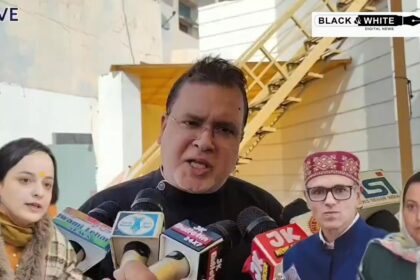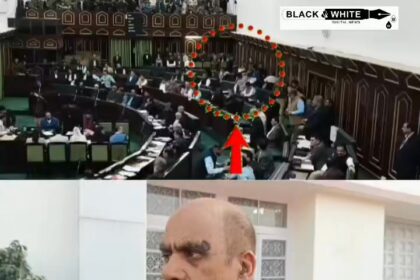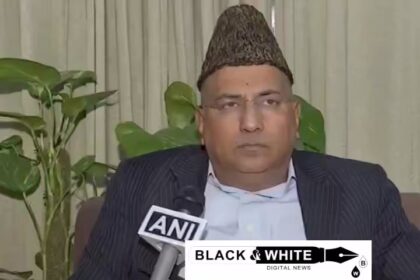||Black and White Digital News||
||November 07, 2024||
In a significant development, Mehraj Malik, the Aam Aadmi Party’s (AAP) lone MLA from Doda, Jammu and Kashmir, expressed his support for a resolution demanding the restoration of the special status of Jammu and Kashmir, even as his party leadership holds a different stance. Despite AAP national president Arvind Kejriwal’s endorsement of the abrogation of Article 370, Malik emphasized his commitment to defending the land and job rights of the region’s people.
The resolution, passed amid considerable debate and intense uproar in the Jammu and Kashmir Legislative Assembly on Wednesday, called for dialogue between the central government and the state’s elected representatives. It highlighted the assembly’s “concern” over the “unilateral removal” of the region’s special status in August 2019, which dismantled Article 370 and Article 35A of the Indian Constitution. These articles had granted Jammu and Kashmir a semi-autonomous status and special rights over land ownership and jobs for its residents.
Speaking to the media outside the legislative chambers, Malik reiterated his stance: “I support the resolution which protects the land and job rights of the people of Jammu and Kashmir. Whatever is in support of the people here and the nation, I will stand with that.” Malik clarified that his primary allegiance lies with the welfare of the people in his constituency and across Jammu and Kashmir, emphasizing that they should retain control over their lands and employment opportunities.
Malik’s stand has raised eyebrows within AAP’s ranks, especially given that Kejriwal and the party’s central leadership have openly backed the decision to revoke Article 370, aligning with the ruling Bharatiya Janata Party’s (BJP) policy at the time. When questioned about this apparent divergence from his party’s stance, Malik stated, “I am simply saying that I support the resolution as it seeks protection of land rights and jobs. This is the issue of the people of Jammu and Kashmir.”
The demand for restoring the region’s special status has been a focal point in Jammu and Kashmir’s political landscape, with voices from various quarters continuing to seek reconsideration of the 2019 decision. The issue is particularly sensitive in Jammu and Kashmir’s heartland, where residents have long held that special constitutional safeguards for local land ownership and employment are crucial for protecting the region’s cultural and demographic integrity.
Jammu and Kashmir’s Chief Minister, Omar Abdullah, lauded the assembly’s stance after the resolution was passed, maintaining a measured response to the media. “The assembly has done its job,” he said succinctly, refraining from further comment, though his choice of words suggested a cautious optimism. The passing of the resolution reflects an emerging consensus among local representatives advocating for Jammu and Kashmir’s rights within the Indian Union.
Observers point to Malik’s support for the resolution as an example of the unique challenges faced by legislators in Jammu and Kashmir, who often find themselves at odds with the policies of their national parties. Malik’s decision demonstrates the difficulties that representatives from the region face as they navigate between national party policies and local demands.
With Malik standing firm in support of the resolution, it remains to be seen how this divergence will impact his political trajectory within AAP. As the only AAP MLA in the Jammu and Kashmir Legislative Assembly, his stance places him in a delicate position, challenging the party’s established stance on Article 370 while emphasizing his commitment to Jammu and Kashmir’s unique needs.
As political stakeholders await the central government’s response to the resolution, Malik’s declaration has injected fresh momentum into the discourse around Jammu and Kashmir’s special status. For the people of Doda and the broader region, his words resonate as a reminder that their representatives are willing to voice local concerns, even at the potential cost of diverging from party lines.
Leave a comment
You Might Also Like
Jammu Kashmir K Har Ek Leader Har Ek Officer Ka Bacha Govt School Me Parna Chahye Jayesh Kumar
Jammu Kashmir K Har Ek Leader Har Ek Officer Ka Bacha Govt School Me Parna Chahye Jayesh Kumar
0 Min Read
Gulmarg Set To Showcase Real Impact Of Khelo Bharat Niti During KIWG 2026
Gulmarg Set To Showcase Real Impact Of Khelo Bharat Niti During KIWG 2026 The upcoming edition of the Khelo India…
5 Min Read
CM Omar Abdullah Ka Shukriya Unhu Ne Assembly Me Kaha Jo Baki Tourist Destinations Band Hai Unhe Bhi Khol Diya Jayega MLA Khansahib Saifuddin Bhat
CM Omar Abdullah Ka Shukriya Unhu Ne Assembly Me Kaha Jo Baki Tourist Destinations Band Hai Unhe Bhi Khol Diya…
0 Min Read
Ghulam Ali Khatana BJP Ka Agent Hai Sheikh Abdullah Ne Azadi Nhi Dilwayi Hoti To Aaj Wo Parliament Nhi Hota Nazir Gurezi
Ghulam Ali Khatana BJP Ka Agent Hai Sheikh Abdullah Ne Azadi Nhi Dilwayi Hoti To Aaj Wo Parliament Nhi Hota…
0 Min Read









